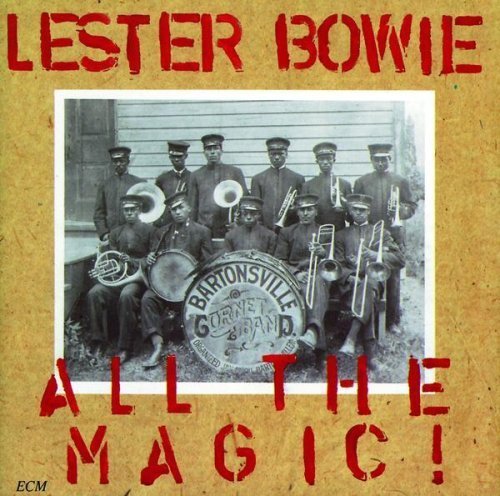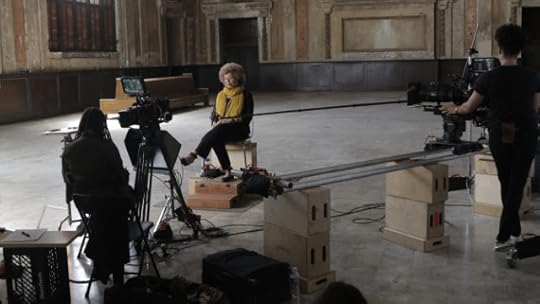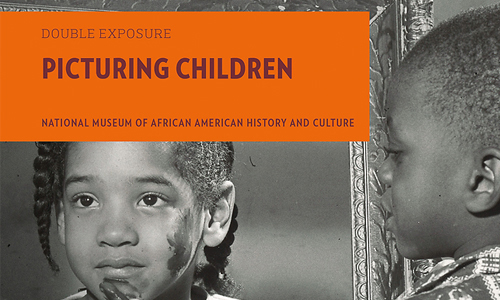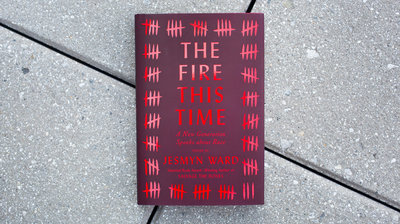Mark Anthony Neal's Blog, page 592
August 5, 2016
An Immigrant Crime Wave? Not According to the Data
 'Is the US’s focus on small-time immigration infringements leaving the nation more vulnerable? In her book,
Caught: The Prison State and the Lockdown of American Politics
, Marie Gottschalk says the data suggest a different trend.' -- +Big Think
'Is the US’s focus on small-time immigration infringements leaving the nation more vulnerable? In her book,
Caught: The Prison State and the Lockdown of American Politics
, Marie Gottschalk says the data suggest a different trend.' -- +Big Think
Published on August 05, 2016 18:38
"For Louie" -- Lester Bowie (from 'All the Magic', 1982)
 The late Lester Bowie pays homage to Louis Armstrong and his legacy, featuring Fontella Bass and David Peaston from his 1982 double album All the Magic!.
The late Lester Bowie pays homage to Louis Armstrong and his legacy, featuring Fontella Bass and David Peaston from his 1982 double album All the Magic!.
Published on August 05, 2016 05:46
Precarious by Design: Life and Death in Police-Occupied Baltimore.
 'Journalist Anjali Kamat explores the mechanisms of police violence and impunity in Baltimore, a year after the killing of Freddie Gray (and a day after the final charges were dropped against police officers involved in his killing) and connects those injustices to a larger set of economic and political forces isolating and criminalizing large swaths of American society from childhood. Kamat contributed the chapter "The Baltimore Uprising" in the Verso Books collection Policing the Planet: Why the Policing Crisis Led to Black Lives Matter.
'Journalist Anjali Kamat explores the mechanisms of police violence and impunity in Baltimore, a year after the killing of Freddie Gray (and a day after the final charges were dropped against police officers involved in his killing) and connects those injustices to a larger set of economic and political forces isolating and criminalizing large swaths of American society from childhood. Kamat contributed the chapter "The Baltimore Uprising" in the Verso Books collection Policing the Planet: Why the Policing Crisis Led to Black Lives Matter.
Published on August 05, 2016 05:14
Authenticity Over Fear: Why Green Party VP Candidate Ajamu Baraka Matters by Lawrence Ware
 Authenticity Over Fear: Why Green Party VP Candidate Ajamu Baraka Mattersby Lawrence Ware | @Law_Ware | NewBlackMan (in Exile)
Authenticity Over Fear: Why Green Party VP Candidate Ajamu Baraka Mattersby Lawrence Ware | @Law_Ware | NewBlackMan (in Exile)I’m not (yet?) with her, and I’ll never vote for Donald Trump, so I’m open to the idea of a third party candidate—and Jill Stein now has my full attention. On August 1, 2016, the presumptive Green Party candidate announced her running mate: the brilliant and progressive human rights scholar and activist Ajamu Baraka.
In a statement released on her website, Stein said:
“I am honored and excited to announce that my running mate in the 2016 presidential election will be Ajamu Baraka, activist, writer, intellectual and organizer with a powerful voice, vision, and lifelong commitment to building true political revolution. Ajamu Baraka is a powerful, eloquent spokesperson for the transformative, radical agenda whose time has come – an agenda of economic, social, racial, gender, climate, indigenous and immigrant justice. Stein concluded by stating “In this hour of unprecedented crisis, we are honored to lift up a unified movement for justice in the only national political party that is not held hostage by corporate money, lobbyists and super-PACs. We look forward to bringing this agenda for justice to the American people in the exciting race ahead.”
Now I’m conflicted.
Many contemporary black academics (myself included) like to think of ourselves as revolutionary; yet, unfortunately, the only thing revolutionary about us tends to be our social media presence. When it is time to sacrifice for a cause, most black intellectuals choose tenure over truth, comfort over a commitment to justice. Not so with Stein’s running mate. He’s the real deal.
Ajamu Baraka is internationally recognized as both a scholar and a human rights activist. He is an Associate Fellow at the Institute for Policy Studies and frequently contributes to Black Agenda Report. He has been featured in publications like the BBC, the Washington Post, and the New York Times. He was the founding executive director of the United States Human Rights Network, and he has served on the boards of human rights organizations like Amnesty International and the Mississippi Workers’ Center for Human Rights. His is a life dedicated to service, and Stein selecting him as her running mate has thrown me into an existential crisis.
I’m conflicted about Hillary Clinton. She has been a fixture in the political sphere for so long that her nomination doesn’t feel groundbreaking—it feels inevitable. President Obama’s sudden rise to the presidency packed an emotional punch because it was so unexpected. He went from a promising orator to a political force in under half a decade. When he announced his candidacy, I cried. When the Democratic Party nominated him, I cried. Perchance, like Carl Thomas, I’m just emotional—but I think it was my surprise that moved me.
When Clinton was nominated, I reflected on the fact that history had been made…and I moved on. It didn’t carry emotional weight for me. Perhaps I, like many self-identified male feminists, am still recovering from my patriarchal socialization and the nomination of a woman doesn’t mean as much to me. Maybe it’s because I don’t have a daughter. Or maybe it’s because of Clinton’s dismissal of Black Lives matter protestors, her record in Haiti, her support for the death penalty, and her prolific use of the phraseology Super Predators in the mid 1990s. Either way, I’m not with her—at least not yet.
That’s why the selection of Baraka is so enticing. Here we have an authentic man whose commitment to justice is shown in the way he lives—not just the words he says. He has sacrificed for a cause he believes in. He inspires and challenges me; however, I’m not yet sold on the Green Party ticket—because he is not running alone.
Jill Stein is equal parts exciting and confusing. Exciting because of her commitment to fighting against economic inequality and racism. Confusing because the Harvard University trained physician sometimes panders to anti-vaxxers and makes bewildering statements like “the answer to neo-fascism is stopping neoliberalism” in response to the danger Donald Trump’s possible election portends.
So while Ajamu’s selection excites and intrigues me, I am not yet sold on the logic of voting for the Green Party…especially if that means possibly clearing the way for a Donald Trump presidency. The temptation to vote one’s conscious is a dangerous one with The Donald representing the other side. Yet, I hear the words of W.E.B. Du Bois ringing in my ears.
On October 20, 1956, W. E. B. Du Bois brilliantly explicated why it may be in the interest of black brown people to vote for a third party candidate if they were displeased by candidates from the major parties. Writing in The Nation, Du Bois contends,
“Since I was twenty-one in 1889, I have in theory followed the voting plan strongly advocated by Sidney Lens in The Nation of August 4, i.e., voting for a third party even when its chances were hopeless, if the main parties were unsatisfactory; or, in absence of a third choice, voting for the lesser of two evils.”
With Du Bois’s words challenging me, I find myself at an impasse. Black voters have been taken for granted by Democrats and all but forsaken by Republicans. Should we allow the fear of Donald Trump to force us into voting for a candidate that we don’t actually believe in? Should we take a look at a third party candidate?
I’m not sure.
One thing I do know is that black and brown people in this country need a change, and maybe taking a serious look at third party candidates is worth the time—especially when the Green Party’s Vice Presidential candidate is a man who unapologetically loves and fights for oppressed people.
+++
Lawrence Ware is an Oklahoma State University Division of Institutional Diversity fellow. He teaches in OSU’s philosophy department and is the diversity coordinator for its Ethics Center. A frequent contributor to Counterpunch and Dissent magazine, he is also a contributing editor of NewBlackMan (in Exile) and the Democratic Left. He has been a commentator on race and politics for HuffPost Live, NPR’s Talk of the Nation and PRI’s Flashpoint. Follow him on Twitter.
Published on August 05, 2016 04:32
August 4, 2016
“5 Minutes Ago”: R&B Interiorities & Realities of Domestic Terror by Mark Anthony Neal
 Carrie Mae Weems--The Kitchen Table series“5 Minutes Ago”: R&B Interiorities & Realities of Domestic Terrorby Mark Anthony Neal | @NewBlackMan | NewBlackMan (in Exile)
Carrie Mae Weems--The Kitchen Table series“5 Minutes Ago”: R&B Interiorities & Realities of Domestic Terrorby Mark Anthony Neal | @NewBlackMan | NewBlackMan (in Exile)On the surface, Sy Ari Da Kid’s “5 Minutes Ago” might be read as another hand-held mediated relationship drama; dudes be all caught up in their technology when a partner sitting across them at the dinner table or a few inches away on the couch (“anytime I’m with you that phone stay in your face”) but decidedly unavailable when physical proximity is compromised (“I know you got your phone with you”).
When Sy Ari Da Kid chimes back in song, “a whole lot has changed in five minutes” -- likely five minutes after the check-in call, intended to alleviate the very drama that ensued when he went silent -- he reveals more than just the challenges of trust, devotion, and betrayal in the digital age; in those five minutes, Rekia Boyd, Trayvon Martin, Michael Brown, Aiyanna Stanley-Jones, Tamir Rice, Tarika Wilson, Tanisha Anderson and Miriam Carey would have all been killed. Those five minutes are, in part, a metaphor for the realities of domestic terror in the lives of those embodied Black and Brown.
Thus Sy Ari Da Kid’s offering that “We”-- as in Brothers -- “only want to hit the scene when you tripping at home; so stop tripping at home,” the audience gets a glimpse into some of the stakes (still high, as The Plugs told us a score ago), as a generation Black Men reimagine the value of the domestic sphere, where professional commitments to those “corners” and even the improvisational social rhythm of just being with your niggas, will in fact get you killed.
Sy Ari Da Kid’s B4 the Heartbreak and BJ the Chicago Kid’s In My Mind voice this tethering to home in their respective music -- both recordings literally have songs that reflect the significance of home in their titles -- but also an excavation of interiorities, an emotiveness, in both form and content, and not quite akin to introspection, that serves as filters for a more profound aesthetic investment in the domestic.
If there is a guiding principle here, besides the natural inclination towards survival, it is perhaps not to be found in the world of contemporary R&B, but rather Hip-Hop, which despite popular opinion has historically been grounded in the practices of introspection even when its affect might suggest a something different.
Sy Ari Da Kid and BJ the Chicago Kid’s trajectories are instructive: Sy Ari Da Kid’s previous recording S.O.O.N. (2015) feels like rank-and-file street bop, whereas BJ the Chicago Kid first came to prominence collaborating with Top Dawg artist Schoolboy Q on “Studio.” Indeed the same post-World War II street corners that incubated the harmonies of Doo-Wop and early Rhythm & Blues, were the same terrain that housed Hip-Hop ciphers a generation later, so no surprises here with regards a shared aesthetic ethos.
Yet, where introspection suggest something more textual -- what we might think of as content -- the more palpable interiority suggest something more ephemeral, and in excess, as in form or sound. And if there’s a quick scan of this room, all eyes or rather sounds, are on Aubrey.
Another Drake album, the stellar Views, and yet more questions about whether the Canadian artist, and his band of fellow outliers, like The Weeknd, are turning Hip-Hop soft. The hard vs. soft dichotomy -- a fissure that some of us might claim was played out even when we thought it mattered for something -- is largely the performance of ever fraught ideals associated with Black masculinity.
That such criticisms of Drake arise at a moment when some are ambivalent about the diversity of The Nation Black -- witness the general silence around Black Transgender deaths and trust that Rev. Dr. William Barber is close to the only Negro clergy in North Carolina standing on that bathroom wall -- when the projection of Black masculinity is supposed to be projecting forward towards enemies clearly seen, duly named, and intrinsically present, should surprise little.
Yet Drake proves prescient; as part of the Afropolitan wing that Negroes only seem to love if their names are Lupita or Oyelowo (and perhaps still Elba), all of Aubrey’s emotionality, filtered as lyrical microaggressions, is above all a simple desire for a home; or perhaps more concretely the domestic, as the physical landscape of interiority, which is why “Marvin’s Room” is just that.
In an era, largely defined by a singular pragmatic Negro -- whose name, as we know, would never suggest as much -- this turn to domestic interiorities, if that is not too much on the nose, is likely born out of pragmatic realities; shit is dangerous and deadly on them streets, and mufuhs need some place to come home to -- even if it might not be an ideal refuge.
And rest assured that less idealized visions of the domestic have much to do with the violence -- emotional, rhetorical and criminal -- that some Black men have long been unable to negotiate and that Black women, because of their literal domestication -- as Wahneema Lubiano opined a decade ago, to leave home for a woman is to lose the protection of God and Nation -- tragically are unable to extricate themselves from. Indeed as Brittney Cooper recently connected the dots of patriarchy, misogyny and anti-Black State violence, it should not be lost that Joyce Quaweay and Korryn Gaines died in their homes or that Marissa Alexander was jailed for firing a protective warning shot in her home.
In this regard what distinguishes 4 the Heartbreak from In My Mind, is the latter’s romanticized notions of home, and the former’s brutal honesty about the pitfalls of home, recalling what Gil Scott Heron and Esther Phillips both acknowledged more than two-generations ago, “Home is Where the Hatred Is.”
BJ the Chicago Kid’s domestic idealism is the likely by-product of his reformed church boy ethos, where home, like “Church,” is multi-layered, multi-generic, and invested in nurturing the talents of a young brotha. Indeed when home, as in Chicago, is literally invoked by BJ the Chicago Kid, it is as an idealized feeling of stability (“Home is all we got / home is where the heart is--and my mind is home”).
Yet the stability of what we might describe as the built-environment of home is contrasted to the instability of the domestic in the music of Sy Ari -- where home is hypertext -- layered fictions of hyper masculinity that reveal deep insecurities and the the need for safety and intimacy. For his part Sy Ari da Kid is reflective with the album’s clear standout “Priorities” (joined by Bryson Tiller): “I feel I could've been a better man for you” which at the very least, lays foundation for the necessary redeeming of home in a moment of crisis and terror.
+++
Mark Anthony Neal is the author of several books including Looking for Leroy: Illegible Black Masculinities (NYU Press, 2016). He is the host of the weekly video podcast Left of Black and curator of NewBlackMan (In Exile). Neal is Professor of African + African-American Studies and Professor of English at Duke University.
Published on August 04, 2016 05:27
Short Shot: Historian Robin D.G. Kelley on His Experience with Photography
 'In this Short Shot, Historian Robin D.G. Kelley talks about his experience with photography on the set of Emmy nominated documentary, Through A lens Darkly!.'
'In this Short Shot, Historian Robin D.G. Kelley talks about his experience with photography on the set of Emmy nominated documentary, Through A lens Darkly!.'
Published on August 04, 2016 04:06
'Making Contact' Presents: COINTELPRO 101 on the FBI's War Against Black + Brown Progressives (1956-1971)
 'In the midst of police shooting community members and gunmen shooting police, and as the republican and democratic conventions wrap up,
Making Contact
looks back at the history of secret surveillance and disruption of organizations dissenting and struggling against all odds.'
'In the midst of police shooting community members and gunmen shooting police, and as the republican and democratic conventions wrap up,
Making Contact
looks back at the history of secret surveillance and disruption of organizations dissenting and struggling against all odds.'
Published on August 04, 2016 03:53
August 3, 2016
The Close-Up: Ava Duvernay Talks New Documentary #The13th
 'The Opening Night selection for 54th New York Film Festival will be the new film from SELMA director Ava DuVernay, THE 13TH, which explores the American prison industry and the horrors of mass criminalization. Eugene Hernandez caught up with DuVernay in Los Angeles to discuss the project. This podcast is brought to you by The Film Society of Lincoln Center. '
'The Opening Night selection for 54th New York Film Festival will be the new film from SELMA director Ava DuVernay, THE 13TH, which explores the American prison industry and the horrors of mass criminalization. Eugene Hernandez caught up with DuVernay in Los Angeles to discuss the project. This podcast is brought to you by The Film Society of Lincoln Center. '
Published on August 03, 2016 10:27
'Picturing Children' Shows More Than A Century Of African-American Childhoods
 'The National Museum of African American History and Culture's director Lonnie Bunch talks about a new book from the museum's collection showing a snapshot of life for African-American children.' -- +NPR
'The National Museum of African American History and Culture's director Lonnie Bunch talks about a new book from the museum's collection showing a snapshot of life for African-American children.' -- +NPR
Published on August 03, 2016 10:05
'The Fire This Time'--A New Generation of Writers on Race In America
 'Author Jesmyn Ward invited prominent writers from her generation to pen essays for The Fire This Time. It's a nod to James Baldwin's work of a similar name, which warned of today's racial tension.'
'Author Jesmyn Ward invited prominent writers from her generation to pen essays for The Fire This Time. It's a nod to James Baldwin's work of a similar name, which warned of today's racial tension.'
Published on August 03, 2016 09:49
Mark Anthony Neal's Blog
- Mark Anthony Neal's profile
- 30 followers
Mark Anthony Neal isn't a Goodreads Author
(yet),
but they
do have a blog,
so here are some recent posts imported from
their feed.



